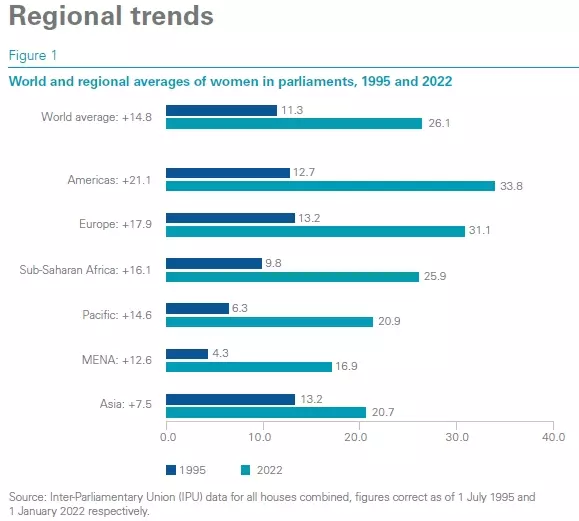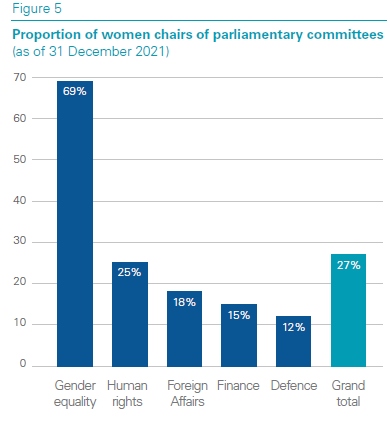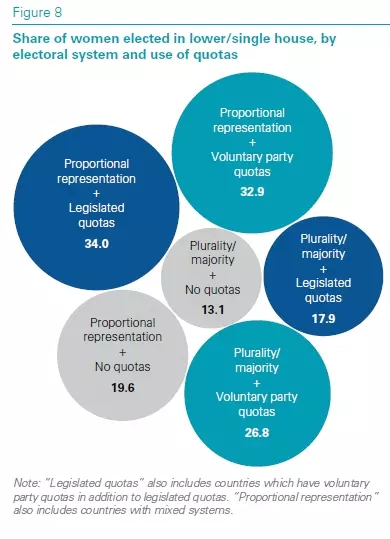Comments
- No comments found

The Inter-Parliamentary Union has released its Women in Parliament in 2021: The Year in Review report, a systematic count of the share of women in national legislatures around the world.
Women have been increasing their share of members in national legislatures and parliaments over time. Here’s the overview from 1995 up through 2021.

When it comes to chairing a legislative committee, women hold 27% of the seats–similar to their overall representation. However, the distribution of these chairs across types of committees is skewed.

Much of the report is a country-by-country overview of changes in the last year or or two. But overall, what causes some countries to have substantially higher shares of women than others? Cultural and historical factors surely play a role, but the report emphasizes some institutional factors as well. For example, a number of countries have a quota requirement: for example, requiring that each party must have a certain proportion of women among its legislative candidates.
As in previous years, quotas appeared to be the most critical factor in determining women’s representation in 2021. Among the 30 countries that had some form of quota system in place for the single or lower house, 31.9 per cent women were elected. This varied a little based on the type of quota – countries with legislated quotas elected 31.8 per cent women on average, and those with only voluntary quotas adopted by political parties elected 32 per cent women. On the other hand, only 19.5 per cent women were elected in lower or single houses in countries with no form of legislated or voluntary quotas.
Another institutional factor that seems to matter here is that countries where elections are by majority vote in a district seem to have a smaller share of women legislators than those with proportional voting–that is, where voters cast their ballot for a party, parties receive seats in the legislature according to how many seats they receive, and parties (mostly) determine who will fill those seats.

This report makes no effort to look at differences in how men and women vote when in legislatures. But the underlying facts seem worth noting.
Timothy Taylor is an American economist. He is managing editor of the Journal of Economic Perspectives, a quarterly academic journal produced at Macalester College and published by the American Economic Association. Taylor received his Bachelor of Arts degree from Haverford College and a master's degree in economics from Stanford University. At Stanford, he was winner of the award for excellent teaching in a large class (more than 30 students) given by the Associated Students of Stanford University. At Minnesota, he was named a Distinguished Lecturer by the Department of Economics and voted Teacher of the Year by the master's degree students at the Hubert H. Humphrey Institute of Public Affairs. Taylor has been a guest speaker for groups of teachers of high school economics, visiting diplomats from eastern Europe, talk-radio shows, and community groups. From 1989 to 1997, Professor Taylor wrote an economics opinion column for the San Jose Mercury-News. He has published multiple lectures on economics through The Teaching Company. With Rudolph Penner and Isabel Sawhill, he is co-author of Updating America's Social Contract (2000), whose first chapter provided an early radical centrist perspective, "An Agenda for the Radical Middle". Taylor is also the author of The Instant Economist: Everything You Need to Know About How the Economy Works, published by the Penguin Group in 2012. The fourth edition of Taylor's Principles of Economics textbook was published by Textbook Media in 2017.
Leave your comments
Post comment as a guest